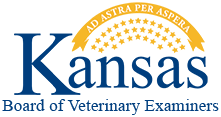Who can offer animal chiropractic?
CHIROPRACTIC TREATMENT TO ANIMALS PROHIBITED EXCEPT AS SPECIFIED BY THE KANSAS VETERINARY PRACTICE ACT
The KANSAS VETERINARY PRACTICE ACT (KVPA) defines Animal Chiropractic as the practice of Veterinary medicine. K.S.A. 47-816(h)(1). The KVPA further establishes that “NO PERSON SHALL PRACTICE VETERINARY MEDICINE IN THIS STATE WHO IS NOT CURRENTLY AND VALIDLY A LICENSED VETERINARIAN”. K.S.A. 47-817.
A limited statutory exception exists allowing a Chiropractor licensed under the KANSAS HEALING ARTS ACT to associate with a licensed Veterinarian whereby Chiropractic treatment of an animal may be delegated. K.S.A. 47-817(i) and K.A.R. 70-7-1(n). Any delegation MUST be either directly or indirectly supervised.
- Direct Supervision K.S.A. 47-817(e).
- The supervising licensed Veterinarian: Is on the Veterinary Premises or in the same general area in a field setting; is quickly and easily available; examines the animal prior to delegating Chiropractic Treatment; performs any additional examination of the animal required by good Veterinary practice; and delegates only that Chiropractic Treatment as is consistent with rules and regulations of the Kansas Board of Veterinary Examiners. See 70-7-1(n) below.
- Indirect Supervision K.S.A. 47-817(g).
- The supervising licensed Veterinarian: Is not on the Veterinary Premises or in the same general area in a field setting; has examined the animal and provided either written or documented oral instructions or a written protocol for Chiropractic Treatment of the animal patient; and delegates only that Chiropractic Treatment as is consistent with rules and regulations of the Kansas Board of Veterinary Examiners. See 70-7-1(n) below.
- Delegation K.A.R. 70-7-1(n).
- The regulation requires the Veterinarian to provide direct supervision of a Chiropractor providing Chiropractic Treatment of an animal, except that a Veterinarian may provide indirect supervision to a Chiropractor that is following the written instructions for treatment of the animal patient on the veterinary premises.
The regulation limits a Veterinarian’s delegation to a Chiropractor of Chiropractic Treatment of an animal as is consistent with the Chiropractor’s training, experience, and professional competence.
The regulation prohibits a Veterinarian from delegating diagnosis, performance of any surgical procedure, and prescription of any drug, medicine, biologic, apparatus, application, anesthesia, or other therapeutic or diagnostic substance or technique.
All Chiropractic Treatment to animals must be performed at a registered Veterinary Premises unless directly supervised in a field setting by a licensed veterinarian. K.S.A. 47-816(k) and K.S.A. 47-840(a); K.A.R. 70-7-1(n).
Note that the above statements are not the exact statutory and regulatory language.
How are complaints handled by the agency?
- Upon completing an investigation of a complaint, the Board investigator will refer the matter to a probable cause committee of board members. If probable cause is found, the committee will either request a consent agreement and order be drafted, a citation and fine, or a disciplinary petition.
- Citation and fine cases will be prepared by legal and signed by the Executive Director.
- If a consent agreement and order is requested, the document will be drafted by litigation counsel upon referral to the Legal Section via a Legal Transfer Request.
- The complete investigative report will be provided for access by Legal staff.
- The litigation attorney will work with the investigator in the drafting of the consent agreement, including factual allegations.
- Once drafted, the draft consent agreement and order will be presented to the Respondent or Respondent’s counsel. Any counterproposals will be discussed between the investigator, attorney, and one or more members of the probable cause committee.
- Once executed/issued, the consent agreement and order will be stamped as a final order by Legal, and the Legal file closed upon Respondent’s compliance with the terms.
- If a consent agreement and order is not requested by the probable cause team or an agreement is not reached with Respondent regarding a proposed consent agreement, the assigned attorney will draft a petition in discipline, to be issued by the Board.
- If a consent agreement and order was not previously requested and the case has not already been transferred to Legal, staff will provide a copy all investigative documents to the litigation attorney as per above.
- Following issuance of the petition in discipline, the matter will be set for hearing.
You can find more information about the process in this flowchart that illustrates the protocol through program investigation and legal review.
Continuing education.......
Each state veterinary board’s CE requirements vary. The Kansas Board requires each licensee obtain twenty (20) hours of CE during each year that begins on July 1, and ends on June 30. There is no provision for carrying over extra hours from one year to the next, or for extending the year’s end date to allow CE to be obtained. There is no provision to waive this requirement for medical or hardship reasons other than active military duty during a time of a national emergency.
The Kansas Board defines CE as “any program or activity which enhances the veterinarian’s level of knowledge, skills, or abilities to practice veterinary medicine.” “Programs or activities” which could enhance your knowledge, skills or abilities extend beyond the traditional conventions and meetings. Unlike many other states, the Kansas Board does allow CE credit for programs or activities that are outside of these traditional conventions and meetings. Consultation with an expert in a specialty area, and self-study of and then testing over compendium articles are two examples of the many programs or activities available to veterinarians today which can enhance their level of knowledge, skills or abilities. Participation in such programs or activities, when you assess that it has enhanced your level of knowledge, skills or abilities, may be counted towards your Kansas license renewal CE requirement.
The Kansas Board asks each licensee to maintain a file containing documentation of participation in CE. Such files may be audited from time to time, and will be audited in the event of a complaint investigation.
